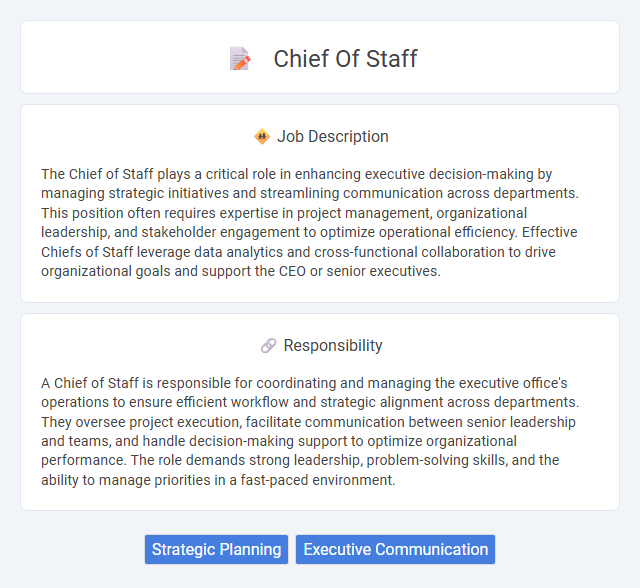
The Chief of Staff plays a critical role in enhancing executive decision-making by managing strategic initiatives and streamlining communication across departments. This position often requires expertise in project management, organizational leadership, and stakeholder engagement to optimize operational efficiency. Effective Chiefs of Staff leverage data analytics and cross-functional collaboration to drive organizational goals and support the CEO or senior executives.
People with strong organizational skills and the ability to manage multiple priorities effectively will likely be well-suited for the Chief of Staff role. Individuals who thrive in high-pressure environments and possess excellent communication and leadership qualities have a higher probability of succeeding in this position. Those who prefer routine tasks or limited interpersonal interaction may find the demands of this job challenging.
Qualification
A Chief of Staff typically requires a bachelor's degree in business administration, management, or a related field, with many positions favoring advanced degrees such as an MBA. Proven experience in project management, strategic planning, and leadership roles within corporate or governmental environments is essential. Strong communication, organizational, and problem-solving skills are critical to effectively supporting executive leadership and managing cross-functional teams.
Responsibility
A Chief of Staff is responsible for coordinating and managing the executive office's operations to ensure efficient workflow and strategic alignment across departments. They oversee project execution, facilitate communication between senior leadership and teams, and handle decision-making support to optimize organizational performance. The role demands strong leadership, problem-solving skills, and the ability to manage priorities in a fast-paced environment.
Benefit
The Chief of Staff role likely provides significant benefits such as enhanced leadership experience and strategic decision-making skills. This position probably offers close collaboration with senior executives, increasing visibility and career growth opportunities. Access to diverse projects and the ability to influence organizational priorities may contribute to professional development and job satisfaction.
Challenge
The Chief of Staff role likely involves managing complex organizational dynamics and aligning multiple departments toward strategic goals, presenting significant leadership challenges. Navigating high-stakes decision-making under tight deadlines may frequently test problem-solving and communication skills. Balancing competing priorities and expectations from executive leadership could consistently require adaptability and diplomacy.
Career Advancement
The Chief of Staff role serves as a strategic partner to executives, offering critical exposure to high-level decision-making and cross-departmental leadership. Mastery in project management, communication, and stakeholder coordination enhances visibility and credibility, accelerating career progression toward C-suite positions. Success in this role often translates to opportunities in executive management, business strategy, or entrepreneurial ventures.
Key Terms
Strategic Planning
Chief of Staff plays a pivotal role in strategic planning by coordinating cross-functional initiatives and aligning organizational goals with executive priorities. This position involves synthesizing complex data to support decision-making processes and ensuring resource allocation matches long-term business objectives. Effective Chief of Staff professionals drive operational efficiency and foster communication between leadership teams to execute strategic plans successfully.
Executive Communication
The Chief of Staff plays a critical role in streamlining executive communication by managing information flow between the CEO, senior leadership, and stakeholders. This role ensures clarity, consistency, and alignment across all executive messaging, helping to amplify the CEO's vision and strategic priorities. Proficiency in crafting high-impact presentations, reports, and internal communications is essential to support decision-making and foster organizational transparency.
 kuljobs.com
kuljobs.com